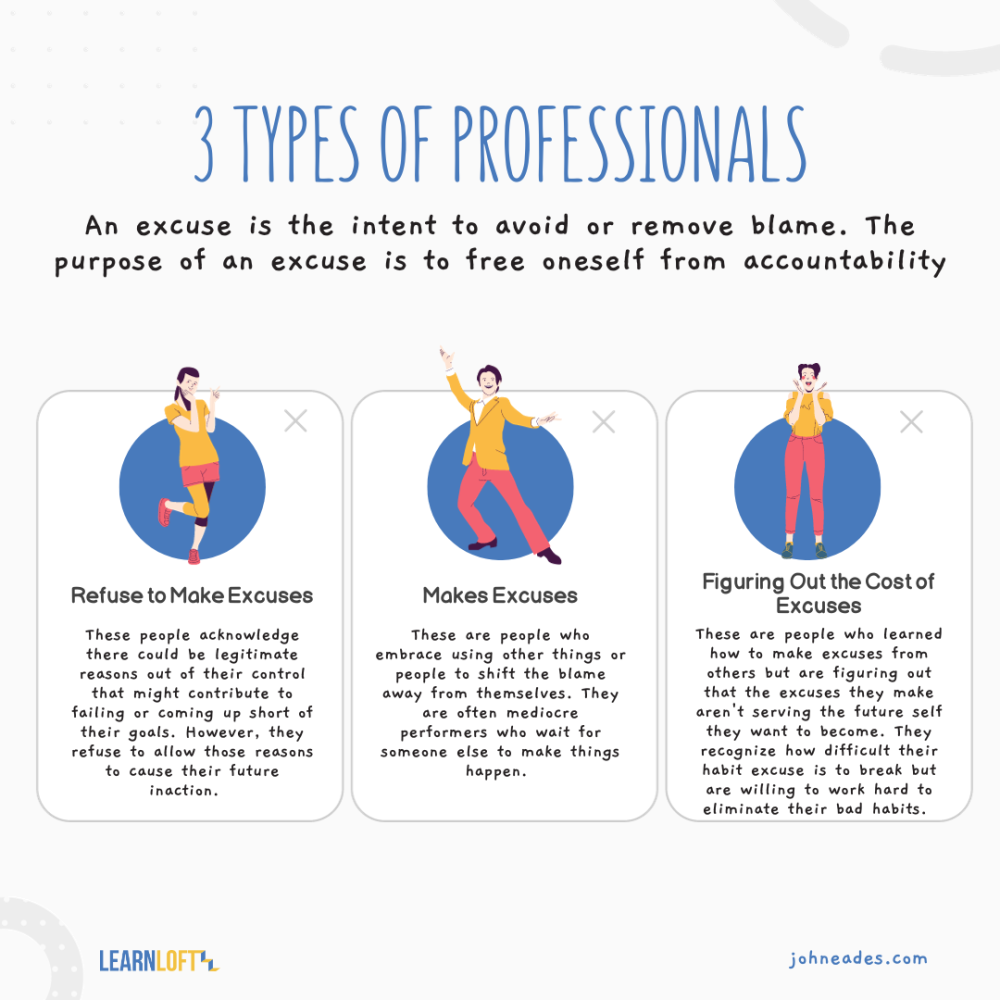Comments
- No comments found

Making excuses is commonplace for many professionals. Who could blame them?
Making an excuse is easier than taking responsibility. If that wasn't enough, it simply feels better to blame someone or something else for a mistake or a lackluster outcome.
However, just because something feels good doesn't mean it helps you. Take Shawn, a first-time manager, as an example. An HR executive had voluntarily selected him to participate in Accelerate Leadership Coaching due to high voluntary turnover and poor performance.
In just two coaching conversations, he used over 20 excuses for his team's issues. They ranged from blaming others, to a lack of resources, to a lack of time, to a lack of skills. Finally, I challenged his thinking by telling him a powerful leadership principle that if he didn't start to grasp quickly, he wouldn't be leading any longer.
Making excuses limits your potential and results.
We can all relate at some level to Shawn because we have all been guilty of making excuses. However, Jim Rohn said it best, "One's willingness to take personal responsibility is the highest level of human advancement." Rohn was right because when you get to a point where you refuse to make excuses, you are powerful, dangerous, and a force to reckon with.
Before we go any further, let's get on the same page about excuses. An excuse, by definition, is an intent to avoid or remove blame. The purpose of an excuse is to free oneself from accountability. They have been used since the beginning of time to shift the blame away from ourselves when we fail someone or something else. People use excuses for many reasons, but the most popular is removing possible pain to escape a difficult or uncomfortable situation.
Sometimes, we make excuses consciously; other times, it's done subconsciously out of habit. George Washington Carver said, "Ninety-nine percent of failures come from people who have a habit of making excuses." Most people who make excuses don't tend to make one; they make them all the time. The reality is habits (repeated ways of behaving) start out as a thin string and end up as a strong rope.
While this might not seem like a big deal, it is. The reason is that excuses are the vehicles that take us further from achieving goals.
An excuse is the vehicle that takes you further away from your achieving goals.
There are legitimate reasons outside of one's control that could cause failure or negative outcomes. This is where the difference between a reason and an excuse comes in. While they have a similar definition, they aren't the same.
A perfect way to understand the difference is to look at a few examples.
A food-related example:
A reason for not eating shrimp at dinner, "I am allergic to shellfish, which causes my through to swell."
An excuse is, "I didn't like shrimp when I was 12, so I won't try them now."
A health-related example:
A reason for not lifting weights is, "I have a broken arm."
An excuse is, "I don't have the time."
Or a sales-related example:
A reason I didn't hit my quota is, "The product was out of stock, so there was no product to sell, but I had buyers lined up."
An excuse is, "No one picked up my calls."
Far too many people have adopted the habit of making excuses versus having legitimate reasons for lackluster outcomes. Said differently, using excuses is a sign of a leader lacking accountability.

After coaching and teaching thousands of leaders over the last decade, I have noticed the professional world is made up of three types of people:
People who refuse to make excuses - These people acknowledge there could be legitimate reasons out of their control that might contribute to failing or coming up short of their goals. However, they refuse to allow those reasons to cause their future inaction.
People who make excuses - These are people who embrace using other things or people to shift the blame away from themselves. They are often mediocre performers who wait for someone else to make things happen.
People figuring out the cost excuses are having in their life - These are people who learned how to make excuses from others but are figuring out that the excuses they make aren't serving the future self they want to become. They recognize how difficult their habit excuse is to break but are willing to work hard to eliminate their bad habits.
Teams and organizations made up of people who refuse to make excuses, perform better and have a high-performing culture. Conversely, leaders who make excuses or allow their team members to make excuses will never maximize their potential.
Since you have gotten this far into this column, you are the kind of person who refuses to make excuses or are looking for ways to make less of them. Here are some proven strategies to avoid excuses and get better results.
1. Take Personal Responsibility
Most people blame, complain, or make excuses without thinking. However, they are a puppet in someone else's story until one takes responsibility for the things they can control and embraces commitment in their life. Now more than ever is the time to take ownership of your life and actions. To take this a step further, maximizing your potential requires personal responsibility.
It is only possible to positively impact the world by taking personal responsibility for your actions. Many people around you will make excuses and try to get you to do the same. Reject those ideas and spend less time with those kinds of people.
2. Set Realistic Expectations and Goals
One factor that causes people to get into the excuse habit is having unrealistic expectations or unattainable goals. Since you are now the kind of person who takes personal responsibility, get your mind right by setting realistic expectations or goals.
Take a kicker in the National Football League as an example. It would be fantastic if a kicker made 100% of their attempted kicks. Unfortunately, perfection in a skill with so many variables isn't possible. So, instead of having an unrealistic goal of making 100% of kicks, a great kicker will set a realistic goal to ensure their routine and mindset is right before every kick.
Regardless of what you are trying to achieve, start by setting up attainable goals to increase the odds that you don't have to give a reason or an excuse when you come up short. Assess the resources, capabilities, and possible obstacles before committing to goals.
3. Get a Coach or Accountability Partner
The most significant cheat code to ensure you don't make excuses is to get a coach or accountability partner to assist you. The reason is that most of us mere mortals need people around to ensure we don't fall into bad habits or to call us out when we make excuses.
Most of us will only go to the point where it gets uncomfortable, and then we will stop. Often, a coach or accountability partner will be there to challenge you to go further and faster than you believe you are capable.
Not sure about the power of a coach or accountability partner? Let's take a planned 5 AM workout as an example. In situation A, you planned to go to the gym at 5 AM, but you are tired and groggy when the alarm goes off. In situation B, you planned to go to the gym at 5 AM. When the alarm goes off, you are tired and groggy, but you know an accountability partner is meeting you at the gym.
In which situation are you more likely to stay in bed, situation A or situation B?
You guessed correctly, situation A.
Having a coach or accountability partner isn't just about having outside expertise, but to reduce the likelihood of making excuses and ensuring results. It reminds me of the motivational principle:
"Don't make excuses, make results."
Making excuses is a big part of a lot of people's lives. But just because others do it, doesn't mean you have to. You are different from the kind of person who wants to limit your potential or your results. Be the person who refuses to make excuses by taking personal responsibility, sets realistic goals, and puts a coach around you.
Now is your time to refuse to make excuses.
John is the CEO of LearnLoft, author of, F.M.L. Standing Out & Being a Leader and host of the 'Follow My Lead' Podcast. He writes or has been featured on Inc.com, LinkedIn Pulse, TrainingIndustry.com, eLearningIndustry.com, CNBC Money, and more. John completed his education at the University of Maryland College.
Leave your comments
Post comment as a guest